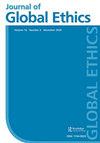Big data, surveillance, and migration: a neo-republican account
Q2 Arts and Humanities
引用次数: 0
Abstract
Big data, artificial intelligence, and increasingly precise biometric techniques have given state and private organizations unprecedented scope and power for the surveillance and dataveillance of migrants. In many cases, these technologies have evolved faster than our legal, political, and ethical mechanisms. This paper, drawing on current discussions of justice and non-domination, proposes a non-domination-based ethics of digital surveillance and mobility, in which the legitimacy of these technologies depends on their avoidance of the arbitrary use of power. This allows us to ethically assess new technologies and justify juridical, democratic, and administrative mechanisms.大数据、监控和移民:一个新共和党的说法
大数据、人工智能和日益精确的生物识别技术为国家和私人组织提供了前所未有的范围和权力,可以对移民进行监视和数据监视。在许多情况下,这些技术的发展速度比我们的法律、政治和道德机制都要快。本文借鉴当前关于正义和非统治的讨论,提出了一种基于非统治的数字监控和移动伦理,其中这些技术的合法性取决于它们避免任意使用权力。这使我们能够从道德上评估新技术,并为司法、民主和行政机制辩护。
本文章由计算机程序翻译,如有差异,请以英文原文为准。
求助全文
约1分钟内获得全文
求助全文

 求助内容:
求助内容: 应助结果提醒方式:
应助结果提醒方式:


